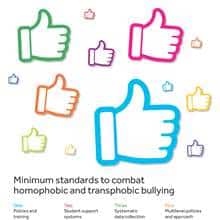At the end of January 2014, the international LGBT youth organisation IGLYO presented the results of its survey of LGBT young people on bullying experiences and their consequences for school, university and work to members of the European Parliament and the European Commission as well as representatives of civil society in Brussels. Sophie Neuberg spoke with Eleanor Formby, author of the survey, and with Jordan Long from IGLYO.

For the 2013 financial International Lesbian, Gay, Bisexual, Transgender and Queer Youth and Student Organisation (IGLYO) The social scientist Eleanor Formby collected 187 responses from young people from five countries in an online survey: Denmark, Ireland, Italy, Croatia and Poland. This selection was intended to capture countries that differ in their commitment to combating bullying, but also in terms of their labour market and economic strength: "If everyone has to fight for jobs, you can assume that some will have to fight even harder," explains Jordan Long, Programme & Policy Officer at IGLYO. "Equality is the first thing that falls by the wayside."
Eleanor Formby has to admit that the number of participants was too low to obtain representative results. However, considering the budget and the tight schedule, she is satisfied with the response rate. She sees the results as a sample that shows trends and identifies problems that need to be addressed. "The survey definitely shows that more research is needed," says Jordan Long.
This showed that it is not only peers who discriminate and bully, but also teachers and parents in some cases. At school, the young people experienced verbal abuse, ridicule, outing, exclusion, threats and use of physical violence or cyberbullying, for example. Discrimination on a broader social level was also mentioned as a burden.

The consequences for their school and professional careers are manifold, such as a lack of self-confidence, loss of motivation and ability to concentrate, isolation, not taking certain degree programmes, a desire to emigrate, fear of outing and discrimination. These findings came as no great surprise to activist Jordan Long. However, he was surprised that some survey participants reported that the discrimination they had suffered had spurred them on to perform even better, to make an extra effort "to show everyone".
But for most of them, the consequences were sometimes serious. Even young people active in gay and lesbian organisations worried about whether they would be able to mention their commitment on their CV or be open about their lifestyle and partnership at work, for example. Some survey participants considered themselves lucky that they had experienced little or nothing negative at school or at work. "Heterosexuals certainly don't think about that," explains Formby. She therefore believes that young people's self-esteem and identity are under threat. 53 % of the survey participants reported depressive moods, 33 % had suicidal thoughts. "Discrimination kills," said MEP Michael Cashman after the presentation of the report.

To coincide with the survey results, IGLYO published a paper setting out four minimum standards for a bullying-free education system: 1. diversity policies and anti-bullying strategies and training for teachers and administrators, 2. support systems for students in general and bullying victims in particular, 3. systematic collection and analysis of data on bullying, and 4. implementation of counter-strategies at local, regional, national and international levels.
The paper is aimed at politicians and educational institutions. Schools, for example, can use it to scrutinise their treatment of minorities and improve the situation where necessary. To this end, the IGLYO has summarised the minimum standards on a poster. "A school that prominently displays our standards demonstrates its willingness to take action against bullying and discrimination," says Jordan Long. That is already something, even if nothing changes immediately. The poster could also be useful for pupils because it gives them something to show their teachers.

Now the IGLYO wants to send its recommendations, the poster and the results of the research to organisations such as the European Students' Union (ESU), which will then take the anti-bullying package to schools. There are already educational organisations working on the issue, says Jordan Long, referring to the "Stand Up!" campaign of the organisation "BeLonG To" in Ireland: it aims to promote solidarity between young heterosexuals and LGBT people of the same age and calls on them to stand up against bullying and stand up for tolerant coexistence.
"We shouldn't forget that not all LGBT young people are victims of bullying. Fortunately, there are always positive counterexamples," emphasises Eleanor Formby.
IGLYO survey: The impact of homophobic and transphobic bullying on education and employment, A European survey 2013, Eleanor Formby, IGLYO, Sheffield Hallam University









